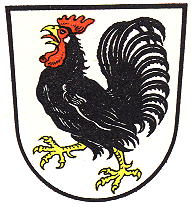Seelze: Difference between revisions
Jump to navigation
Jump to search
Knorrepoes (talk | contribs) m (Text replace - "|width="15%"|50 px|right |}" to "|width="15%"|50 px|right |}<seo title="Wappen, Gemeindewappen" />") |
Knorrepoes (talk | contribs) m (Text replace - "[[Literature" to "{{media}} [[Literature") |
||
| Line 22: | Line 22: | ||
The arms are derived from the arms of the local noble family Von Selesse, which had its estate in the village until they became extinct in the late 15<sup>th</sup> century. The use of the rooster as their symbol is known from 14<sup>th</sup> century seals. | The arms are derived from the arms of the local noble family Von Selesse, which had its estate in the village until they became extinct in the late 15<sup>th</sup> century. The use of the rooster as their symbol is known from 14<sup>th</sup> century seals. | ||
{{media}} | |||
[[Literature]] : Stadler, K. : Deutsche Wappen - Bundesrepublik Deutschland. Angelsachsen Verlag, 1964-1971, 8 volumes. | [[Literature]] : Stadler, K. : Deutsche Wappen - Bundesrepublik Deutschland. Angelsachsen Verlag, 1964-1971, 8 volumes. | ||
Revision as of 05:57, 9 July 2014
| Heraldry of the World Civic heraldry of Germany - Deutsche Wappen (Gemeindewappen/Kreiswappen) |
SEELZE
State : Niedersachsen
District (Kreis) : Region Hannover (until 2001 Hannover)
Additions : 1974 Almhorst, Dedensen, Döteberg, Gümmer, Harenberg, Kirchwehren, Lathwehren, Letter, Lohnde, Velber
Official blazon
Origin/meaning
The arms were granted in 1934.
The arms are derived from the arms of the local noble family Von Selesse, which had its estate in the village until they became extinct in the late 15th century. The use of the rooster as their symbol is known from 14th century seals.
Contact and Support
Partners:
Your logo here ?
Contact us
© since 1995, Heraldry of the World, Ralf Hartemink 
Index of the site
Literature : Stadler, K. : Deutsche Wappen - Bundesrepublik Deutschland. Angelsachsen Verlag, 1964-1971, 8 volumes.











